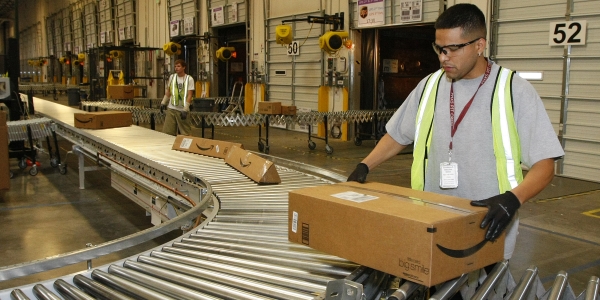How the Internet Is Making States Poor
The wild growth of online shopping is one of the powerful forces hurting state sales taxes collections.

The recession and the early, brittle years of the economic recovery absolutely shredded state budgets. With growth now returning to healthier levels, this should be a time for relief legislators. Unfortunately, as USA Today reports, they might have to face another sobering reality: The system most states rely on to generate sales tax revenue could become obsolete.
The paper writes that last year, state sales taxes claimed the smallest fraction of overall consumer spending since 1967. Americans paid an average tax of 4.27 percent on purchases, down from 4.63 percent five years before. While overall consumer spending rose 4.7 percent in 2011, collections grew by a mere 1.2 percent.
To put it mildly, this is no good. States are desperate for money. And in parts of the country that lack an income tax, such as Texas and Florida, sales taxes are crucial for funding a basic level of government services.
There are a complicated set of forces dragging down sales tax revenue. But as you might suspect, the growth of of eCommerce is playing a big role. Thanks to a 1992 Supreme Court decision, states can't tax retailers unless they have a physical presence within their borders. That's why Amazon, for instance, has to pay sales tax on purchases made in states where they have offices or warehouses, but not elsewhere. As more consumers shift their shopping to the web, less money goes into state coffers. A 2009 study from the University of Tennessee projected that states would lose as much as $12.6 billion this year due to online shopping.
Cars, televisions, books and other taxable items account for just one-third of spending today, down from half in 1970. And much of what's bought -- prescription drugs, hearing aids, clothing, food -- is taxed at reduced rates or not at all.
Worse yet -- again, from a state budget perspective -- consumer goods are cheaper today than in the past. The wonders of the global supply chain have brought down the costs of everything from TVs to underwear. So when consumers go out and buy, they're not spending as much.
Solving the eCommerce problem is relatively straightforward. Right now, there's a bipartisan bill in Congress, called the Marketplace Fairness Act, which would allow states to begin collecting sales taxes from Internet retailers so long as they take a few basic steps to make the process simple and efficient for businesses. eBay has opposed the bill so far, claiming it doesn't do enough to shield small businesses. But Amazon, which expects to begin paying sales tax in more and more states over time, supports the bill, as do a number of high profile Republican Senators and Governors -- a key element to passing any legislation with the word "tax" involved.
There's no telling whether any piece of legislation will ever escape the current Congress. But this bill could at least potentially fix states' big eCommerce problem in a single swoop. On the other hand, no legislation is going to reverse a long-term shift in the way people spend their money.
How can they confront such a shift? States could try and start taxing most services, but as USA Today reports, only two have tried and both reversed course in the face of voter fury. There's also the option of expanding sin taxes, but those tend to be particularly regressive, and equally difficult to sell to the public (unless you're talking about a tanning salon tax -- nobody but John Boehner seems to get upset about that one). Then, of course, there's the good old income tax. But most legislators are loathe to increase those rates at the risk of pushing residents into other states.
There isn't an obvious, politically feasible solution to the sales tax problem. But unless states can find a fix, better economic times won't necessarily end their future budget woes.
Image: Reuters
><